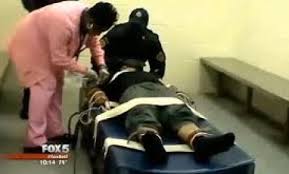McNeely and implied consent laws - Part I

So I'm sitting in the office pounding out yet another appellate brief - the sixth one in the last four weeks - when I get a call from one of my numberless horde of regular readers. "Hey, I'm a big fan," he says. "Who isn't?" I respond humbly. "Listen," he tells me, "you've got to write a post about Ohio's implied consent law."
I'm skeptical at the outset. For a variety of reasons, some of which make sense and some of which don't, I don't handle DUI cases. (Although I'm guessing that if somebody walked into my office right now, told me, "Russ, I blew a .16 in Rocky River last Friday night, and I'm supposed to be in court tomorrow," and plunked twenty-five Benjamins on my desk, I could see my way clear to deviating from my standard practice.) My initial reaction to his suggestion was that I'm as likely to write a post about implied consent as I am about Ohio's uniform partnership law, which, as best I can make out, requires partners to wear uniforms. But, my reader tells me, the Supreme Court's recent decision in Missouri v. McNeely may have a major impact on the implied consent law.
And he may just be right.
First, let's talk about the implied consent law, which is contained in RC 4511.191. The key provision is (A)(5)(b):
If a person refuses to submit to a chemical test upon a request made pursuant to division (A)(5)(a) of this section, the law enforcement officer who made the request may employ whatever reasonable means are necessary to ensure that the person submits to a chemical test of the person's whole blood or blood serum or plasma.
As the picture above shows, that "reasonable means" can include the police going all North Korea on you and strapping you to a gurney to have a nurse come in and draw the blood. In fact, just two years ago the 9th District upheld that very procedure in State v. Slates. Slates was stopped for drunk driving, and when he refused to submit to a breath test, he was taken to a local medical center. Because of his "continued lack of cooperation," one of the officers held down his hands "thereby allowing the nurse to finally draw the suspect's blood." In approving that procedure, Slates relies on the Supreme Court's 1966 decision in Schmerber v. California, where the Court upheld the drawing of Schmerber's blood in similar circumstances.
But Schmerber had also held that a blood draw was a "search" within the meaning of the 4th Amendment, and that's how we come to McNeely. If it's a search, does that mean a warrant is required? Schmerber glossed over that issue, determining only that the search was reasonable in the circumstances of that case. As I explained when I initially discussed the decision, in McNeely the state argued that a warrantless blood draw was always permissible, because the natural metabolization of alcohol in the body created a per se exigency allowing the police to dispense with a warrant. The Court rejected that argument, and held that whether a warrant is required in a particular case is to be determined by our old friend, "the totality of the circumstances."
Still, the decisions aside, in the land of the free and the home of the brave, how the hell did anybody think they could get away with a forced blood draw? Well, that's where the "implied consent" part of this comes in. The statute specifies that anyone who drives a car is "deemed to have given consent" to a blood test. Just four years ago in State v. Hoover the Ohio Supreme Court sanctioned that, relying on Schmerber for the position that "if an officer has probable cause to arrest a driver for DUI, the result of an analysis of a blood sample taken over the driver's objection and without consent is admissible in evidence, even if no warrant had been obtained."
Well, as McNeely makes clear, Schmerber didn't create a per se rule. That doesn't mean that a forced blood draw is impermissible, it just means that the police either have to get a warrant or be prepared to show that the exigencies of the moment didn't permit that.
McNeely pretty much kills the idea of a forced blood draw being permissible because the person impliedly consented to it by taking the wheel of a car. In fact, such an interpretation would make McNeely a dead letter. Yes, I know the bit about driving a privilege and not a right, but conditioning your ability to drive on your willingness to submit to a forced blood draw is no more tenable than conditioning it upon your agreeing to have your car stopped and searched at any time.
But there are several other questions here. The statute also imposes penalties for refusing to submit to a test; does McNeely negate those penalties as well? And what about breath tests?
We'll talk about that tomorrow.
Comments